READER COMMENTS ON
"AZ Daily Star Editorial Can't See The Quicksand For The Trees"
(37 Responses so far...)
COMMENT #1 [Permalink]
...
Jeff J.
said on 7/26/2006 @ 5:48 am PT...
Good response Winter.
I find it impossible to believe that election officials haven't heard at least something about the issues you raise here.
The fact that the HAVA was forced down our throat by Bob Ney (who's about to go to jail) and his cronies should be a big hint to skeptics that something's rotten about the way all these election officials are running to purchase Diebold equipment.
They act and speak the company (Diebold's) line, as if there's irrefutable evidence that their machines are perfect.
If they honestly want to know whether the machines are "Good to go", then they should ask Harry Hursti or Bev Harris to come in and test the machines for them. I mean, why not use the experts in this field?
The unfortunate truth is that Diebold has already gotten to these officials and all they'll say and do from this point forward is window dressing. I agree that the fundamental problem that's allowing this fiasco to continue across America is the fact that we've allowed a private corporation to count our votes with proprietary software that cannot even be looked at. (Although Bev Harris has seen the code and has demonstrated how easy it is to hack in to.)
The AZ Daily Star editorial sounds like another clever vehicle of propaganda to soothe the masses into believing they'll have election integrity. Unfortunately, many, if not most, who read it will probably believe it.
COMMENT #2 [Permalink]
...
czaragorn
said on 7/26/2006 @ 6:56 am PT...
Chuck Huckleberry??? Come on...
COMMENT #3 [Permalink]
...
Bluebear2
said on 7/26/2006 @ 7:46 am PT...
Here's another view from the Washington Post which only sees half the problem.
COMMENT #4 [Permalink]
...
John Gideon
said on 7/26/2006 @ 8:00 am PT...
There are any number of problems in what is being done in Pima County. First, they are going to spend over $1M to buy machines (410 machines for over $3,000 each) and then potentially not use them? Who are they kidding. There is no way a politician can expect to spend that kind of money and then decide that it was just a mistake.
Forgetting all of the security issues that everyone seems to be looking at, there is still an issue with reliability. Diebold machines breakdown far more often than any of the other vendors products, and they are all bad. Reliability is measured in MTBF which stands for 'mean time between failure'. An incandescent light bulb has a tested and certified mtbf standard of 1000 hours of use before failure. A standard PC is 30,000 hours. The federal standard for voting machines is 163 hours. The best Diebold could do in batch tests in California was 60 hours - sixty hours - six zero hours.
The fact that the machines are not reliable should be a deciding factor but the county will ignore that.
Last is their insistence on using Utah as a gauge of success. Utah has no vvpat so no one knows if the machines were accurate because they also have no audit requirement. They did three recounts and all three were just reprinting the end-of-the-day tapes and comparing them with the originals. Hardly a recount of anything.
We on VotersUnite.org have stacks of information about Diebold failures. The county is welcome to look at all of it. They probably have most of it already. But it will be ignored because it doesn't prove them right and they want to buy those machines no matter what.
COMMENT #5 [Permalink]
...
BOB YOUNG
said on 7/26/2006 @ 8:03 am PT...
“Voters will also get a chance to confirm their ballots with the new equipment. In our July 2 editorial, we pointed out that a voter-verified audit trail is required in Arizona. After a ballot is complete on the touch-screen machine in the voting booth, the voter must ask for an electronic summary or, for the visually impaired, an audio feedback .
The voter has the opportunity to correct a miscast vote or a skipped item; only when a voter is satisfied does he or she press the ‘cast ballot’ button, Pima County Elections Director Brad Nelson explained earlier this month.
It should be blatantly obvious that the above procedure is no verification whatsoever as to whether any vote will be counted as cast. The machine can easily be programmed to adjust the voters selections anyway it wants to after the “cast ballot” option is touched. The above procedure is a must before any touch screen or push button machine can be approved to count the vote but it is clearly not sufficient to call the result verified! In addition the machines must print out a uniquely numbered receipt of the selections of each voter for each voter’s records and another one for the records of each precinct. The machine can then create and publish a complete list of the selections of all voters by number. The voter can then check to see that the receipt is correct before leaving the voting booth. No rational voter will be convinced that their vote was counted by these easily to manipulate machines with anything less for “verification”! The voters can then check the publication to see that there ballot really was counted as cast. If it can be shown that the published results very by as much as 0.1% from the receipts given to the voters it is proven that the machines failed in their attempt to count the votes anywhere near up to the ability they have to do so and the receipts given to the precinct automatically take over as the vote of record. The Company that contracted to count the vote but clearly failed to do so is then charged with the cost of a hand count of those receipts which determine the outcome of the election. Couple this with measures to eliminate ballot stuffing and we have a verified election. Nothing less can rationally be considered verified voting!
COMMENT #6 [Permalink]
...
Freedom Fan
said on 7/26/2006 @ 8:13 am PT...
Gee, what new conspiracy theories will the libs hafta invent after the dhimmicrats win in the next election?
Will libs apologize for smearing Diebold without any proof, or will they just drop the whole issue and pretend they never said anything? Maybe they will invent a new story about how they forced Diebold to fix their machines from their constant "pressure". Yeah, that will proly be the one they go with.
Doncha think that if Diebold were guilty of any malfeasance or flaws that they would go bankrupt overnight like when Arthur Anderson lost credibility after failing to properly audit enron?
Doncha think that if the Republican party were guilty then this would be a far bigger story than Whitewater? It would be a wound from which the party would never recover; they would hafta start a new party.
Doncha think that if there were any proof it wouldn't be stuck in a backwater blog of rabid partisans; it would be front page news in the New Yuk Times?
This is simply a smear job without any proof whatsoever by libs with white-hot anger over having lost a couple elections. As typical libs they have no honor, no integrity...they are like prostitutes who will say and do anything for political advantage. Disgusting.
This is actually Winter Patriot's second favorite bonehead conspiracy theory after the myth that LJB killed JFK.
This is a tale full of sound and fury told by an idiot, signifying nothing.
COMMENT #7 [Permalink]
...
BOB YOUNG
said on 7/26/2006 @ 8:42 am PT...
Freedom Fan
Your last line is a very complete and accurate description of your entire comment. You wasted way too many words. Be more precise next time!
Any "Freedom Fan" would want to protect the right to vote. You are no Freedom Fan!
COMMENT #8 [Permalink]
...
Winter Patriot
said on 7/26/2006 @ 8:49 am PT...
Ah! here's "Freedom Fan" again --- note the disguise.
Long time no see, "FF". And guess what? Things have changed here since the last time we met up. Your disinformation is no longer welcome here. Sorry.
It doesn't take a conspiracy theory to envision a rigged election. A single person could swing an entire election. And that's no wacko blog hallucination: it comes from a report by the Washington Post! Eminent computer scientists talking here, FF. Election integrity questions are not just for the blogs anymore, in case you hadn't noticed.
When did we last cross paths? Last summer, wasn't it? Back then you were saying there had never been any violations of anyone's civil rights because of the so-called Patriot Act. What a laugh.
Some fan of freedom you turned out to be.
And now you show up again out of the blue, spouting even more lies. I'm too busy to refute them all but here's one that you can take as a challenge:
If you can find any post that I have published anywhere on the net --- here at The BRAD BLOG, at my once and perhaps future blog (Winter Patriot), at my other former blog (The Whispering Campaign), or in my other former diary (at Booman Tribune) --- where I have said "LBJ killed JFK", post a quote and a URL, right here, on this thread ... and I might consider letting you comment here again.
Otherwise, sayonara!
COMMENT #9 [Permalink]
...
Winter Patriot
said on 7/26/2006 @ 8:53 am PT...
Ah ... the squeaky wheel gets the grease first, no?
Thanks to John and Bob and Jeff and all the others for your thoughtful comments. I always learn a lot here at the green and yellow blog --- even on threads that develop from my own posts --- and I think that's really neat. So thanks to everyone again and please keep the goodies comin'!
COMMENT #10 [Permalink]
...
Prup (aka Jim Benton)
said on 7/26/2006 @ 9:08 am PT...
Rather than comment here, I sen a long letter to
annbrown@azstarnet.com
describing my and our concerns over this problem, mentioning the Dobbs, Crier, and Hedgecock concerns, the Hursti study and the Brennan study. She has, in the paper, promised to reply to the concerns, and I hope that calm, unhysterical letters, sending her here to investigate the problems will be effective.
(Sorry, btw, I didn't get involved in the open forums, but Lebanon, a heat wave, and the death of my oldest (20 yrs) cat have taken up too much of my time recently.)
Prup
COMMENT #11 [Permalink]
...
Winter Patriot
said on 7/26/2006 @ 9:17 am PT...
Hi Jim, and thanks very much for your comment #10. Thanks also for sending the letter. It's nice to see you around again ... and I hope we can work together on a lot of important things, even if we don't necessarily agree on Everything! 
... and condolences, and best (cold) wishes, and please don't be a stranger!
COMMENT #12 [Permalink]
...
molly
said on 7/26/2006 @ 9:18 am PT...
Thanks winter patriot for posting this sad commentary on the demise of democracy. My thoughts are, there has been a lot of bribery for the ignorance of public servants not to know facts that are relevant to their jobs. Newspapers are for propaganda and their subscriptions have fallen off dramatically. Let's face it. Propaganda is boring. I am concerned for RFK Jr's lawsuit because of the ruling that AT&T does not have to even go to court for breaking the law. The senate is trying to find a way to make our dear leader's breaking the law legal. We are quickly being turned into a lawless country. They will be getting more brazen.A fair election in Nov. would mean a dem. majority in the House and Bushco would be out of a job or worse. Think they will be stalling and also getting meaner. Look what happened in Alaska. How can we brainstorm if we don't want to name the problem. Fascist takeover of our country. State media. Genocide in the Katrina debacle. Illegal wars and possible WW3. I'm very tired of the endless "reporters just not doing good investigative journalism"..election officials just not knowing the facts so as to have fair and ho02EB3nest elections. Look at what is happening to Cynthia McKinny. So called liberals/dems. demonize her more than the opposition.No taxation without representation. I want my country back.
COMMENT #13 [Permalink]
...
Peg C
said on 7/26/2006 @ 9:48 am PT...
Too bad all those millions (billions?) of dollars from HAVA have been spent on plastic and electronic components, only some fractions of which can be recycled, instead of on public housing, medical assistance, etc. When money goes to corporations instead of people, we know that corporations will adapt their strategies to perpetuate their own gravy trains at the expense of any and all "competitors" (read "real people").
How else could this ridiculous mess have come to pass? If humanity had expended this much "spirit and waste of shame" on reinventing the wheel, when simple logic demands that simplicity of design is best, we'd never have survived into this century.
I say "Pen and paper, period!" And recycle whatever CAN be recycled and consign the rest of this fiasco to quixotic history.
(This post would be less disjointed if my internet connection had not gone down five times during its composition. Sorry.)
COMMENT #14 [Permalink]
...
Ram
said on 7/26/2006 @ 9:51 am PT...
So I guess this means that Kyl is going to for sure steal AZ again this November.
COMMENT #15 [Permalink]
...
Bluebear2
said on 7/26/2006 @ 9:59 am PT...
Hmmmm Google "diebold election fraud":
"Viewing results 1-10 of 827,000"
COMMENT #16 [Permalink]
...
sanitysojourner
said on 7/26/2006 @ 10:37 am PT...
As a former IT Executive in the state public sector, let's step back and think about the role of government:
The number one mission is to protect the investment of the citizens (of the municipality, state, nation). Public safety, of course, comes first in that investment.
Another key mission is to guarantee that the rights of the citizens are not abridged.
In carrying out any activity, the process that government uses should be risk averse. That is to say that the public sector should not be a "type A" company, taking risks with new approaches, things that cannot be heavily documented and defended. After all, any given state has millions of "customers," made up of its citizenry. That citizenry rightly does not like its tax dollars being wasted or gambled.
With no intent to get off topic, an example of state government gone mad is Ohio's investment of its Workers' Comp fund in "rare coins." That is not the way government should invest its funds; the risk is high and the accounability is minimal.
Getting back to voting machines, every contract I let out for bid required that:
1) we own the source code;
Note: not owning the source means that you have to go back to the producer of the software for updates. It gets you into a lifetime contract. That goes against the risk averse: suppose the company goes belly-up? Suppose, as is often the case, you have no funding for necessary updates? The only way to manage is to have your own IT staff be capable of taking over management of the project.
2) the product had to be validated and compared to the manual process prior to release;
3) every transaction had to have a documentable (yet personally non-identifiable) audit trail;
4) we were unable to break the code which included using real-life simulations, beta tests by users and small scale installations; and
5) we could sue for non-compliance of anything, including unmet dates, unmet criteria. The simple mantra was: in all disagreements between vendor and the state, the state wins.
Sooo, even if the machines were PERFECT, which we know they are not, the process, including the contracts, by which the states are adopting these machines is wrong. If you are a citizen of one of the impacted states, get to your local rep & senator with the complaints about the contracting and approval PROCESSES and ask for full-blown proof that the appropriate processes were used. Your reps have to follow up with that.
As long as we argue on the "they work" vs. "they don't work" level, the voting machine companies will prevail. Go after the governmental bodies on process. Again. And again. And again.
COMMENT #17 [Permalink]
...
Peg C
said on 7/26/2006 @ 11:02 am PT...
Sanitysojourner
And if those representatives are in the pockets of the voting machine companies? What then?
We are being stonewalled on so many levels at this point that it's unbelievable! Look up Alaska's situation, in which the "authorities" are telling the public that past election DATA is solely owned by the proprietary companies!!
COMMENT #18 [Permalink]
...
oldturk
said on 7/26/2006 @ 11:26 am PT...
7/26/06 Washington Post
Voting jurisdictions may not be ready for the use
of electronic voting machines come Novembers mid-term
elections. (Like a run away train,.. speeding toward the impending wreck ?)
Link to article
COMMENT #19 [Permalink]
...
sorseress
said on 7/26/2006 @ 11:49 am PT...
Thank you, thank you, thank you, WP! The links you provided will help me write a letter to the editor which can be referenced to the various problems jurisdictions have had with the Diebold machines, as well as the testing that shows how easily hackable they are. Couple that with the failure rate, and the long term requirements for company maintenance, there should be enough reasons for the supervisors to rethink their decision. All we need is for one vote to "flip". 
COMMENT #20 [Permalink]
...
sanitysojourner
said on 7/26/2006 @ 11:53 am PT...
Peg C,
Valid concern. Citizens need to keep rattling cages at every level of government: sec of state, reps, etc.
But if you really want to get them riled, write a letter to your local paper AND to the paper or papers in the state capital. 100% guaranteed: the politicos and bureaucrats hate nothing more than hitting the papers. A good day, in the high level bureaucracy, is not making the news. Indeed, the criteria for some states activities were: would this hit the news on a slow news day?
This is a truism particularly at the state and local levels. If the papers are in the back pocket too, well, you're (we're) screwed.
COMMENT #21 [Permalink]
...
Winter Patriot
said on 7/26/2006 @ 12:17 pm PT...
sorseress #19: Thanks for the kind words but don't just thank me. There are lots of good points being made here in the comments by readers who know more about this stuff than I do. Please don't forget to thank them, too!
COMMENT #22 [Permalink]
...
Hulk
said on 7/26/2006 @ 12:43 pm PT...
I'm living in Mexico now, and have for the past year and a half. Watching this election, and seeing the aftermath of the tally, one question comes to my mind over and over again. How can you fairly count votes. Or more importantly, how is it possible to assure that even the vote counters are counting them correctly.
Ok, forget Diebold and that mess for a minute. We go back to counting votes by hand. Who is watching the counters? What sort of check and balance system actually assures us that I'm not putting all the ballots in the pile of he/she who I want to win?
Recounting is always an adventure. How do tallies come up different each time? Remember the fiasco in WA's governor race? Christ, a handful of votes made the difference, and it seemed everytime they counted they would come up with a different total.
What precautions are being taken now, or have been taken with paper ballots, to assure that the totals are actually the totals???
Does anyone know? or does it vary from county to county, state to state??
COMMENT #23 [Permalink]
...
sorseress
said on 7/26/2006 @ 2:09 pm PT...
WP, There are indeed a lot of really great comments and very good information from others, and I intend to use as much of it as possible. Thanks everyone. I have another quetion. What are the problems with the Diebold optical scanners?
COMMENT #24 [Permalink]
...
Winter Patriot
said on 7/26/2006 @ 3:47 pm PT...
COMMENT #25 [Permalink]
...
Shannon Williford
said on 7/26/2006 @ 5:17 pm PT...
Hulk, #22, how to have a believable election?
First, do not confuse ballot stuffing (as is tradition in some areas) and graveyard voting with electronic (computer-based) voting.
The difference is that ballot-stuffers or even ballot-losers have to deal with paper, and the very physicality of the paper keeps the numbers of fraudulant votes down.
For example, if a bunch of fake votes are to be exchanged for real votes, the real votes have to disappear. And it is difficult, and there are more chances to be caught, if there is actual paper to be disposed.
On the other hand, electronic computer votes can be flipped without a paper trail in many ways; thousands and even millions at a time. We cannot compare computer vote fraud with old-time paper vote fraud due to the massivneess of the numbers available to computer hackers...
What to do? How 'bout like in France, where they vote with pen on paper, then put the ballot into a large clear plastic box. At the end of the voting day they dump the ballots out on a table and count them in front of anyone who wants to observe. They have procedures for questioning votes, but they are rarely used because the whole thing is transparent and in the open!
shw
COMMENT #26 [Permalink]
...
Winter Patriot
said on 7/26/2006 @ 5:38 pm PT...
re #25: nice post, Shannon, lots of common sense there and thanks very much for that. BTW I've been Googling your name and your band and all kinda stuff lately and I have to say: YOU ROCK!
I can't believe I thought --- a few open threads ago --- that you didn't know who Jimi was. LOL @ WP!! Please say Hi to his old friend Billy when you see him and tell him he's got a very cold green and yellow fan, y'hear?
COMMENT #27 [Permalink]
...
Peg C
said on 7/26/2006 @ 6:42 pm PT...
WP -
Great thread you've got going here! 
COMMENT #28 [Permalink]
...
Freedom Fan
said on 7/26/2006 @ 8:04 pm PT...
Winter Patriot says:
If you can find any post that I have published anywhere ... where I have said "LBJ killed JFK", post a quote and a URL, right here, on this thread � and I might consider letting you comment here again. Otherwise, sayonara! -Winter Patriot
You proly thought I was too lazy to fact check you. You would be wrong:
In a classic black op, the legend is carefully constructed and documented long before the crime is committed, and then the details are slowly leaked to the stunned public. The same thing happened when JFK was killed.
In retrospect I can see so many parallels between the JFK assassination and the 9/11 attacks that I find myself wondering whether these two national tragedies are all part of the same event: a gradual coup d'etat that has turned America from a more-or-less peaceful liberal democracy into a raging war-mongering tyranny. I don't have any answers, but I sure do have a lot of questions.
Winter Patriot
Clearly you stated your suspicion that the JFK assasination was a coup d' etat (after which LBJ took over). I will leave it to your readers to decide whether that equates to "LBJ killed JFK".
But I also admire your candor that you have bupkis for facts. Woman's intuition perhaps.
But I don't blame you for wanting to get rid of me. Obviously your obsession with goofy conspiracy theories about JFK, 9/11, Diebold, Bigfoot, etc. cannot withstand the sunshine of truth and common sense.
COMMENT #29 [Permalink]
...
Winter Patriot
said on 7/26/2006 @ 8:40 pm PT...
LOL @ FF again and it's really refreshing to see a troll with such a good sense of humor --- still crackin' one-liners as the door belts him in the ass ... It was a great try --- I knew you'd make a good effort --- but there's no cigar in it for you this time, FF.
To say "I have questions about X ... I wonder whether X and Y were connected somehow" is much different than saying "I think X killed Y".
I believe most readers will see that quite easily, and those who don't will probably hear from Dredd.
But three cheers for the effort, FF. Like a fine-fielding first baseman, you've made a great big stretch, but even you couldn't stretch far enough. Your foot came off the bag a long time ago. As I knew it would.
I am 100% certain that I have never ever said or even implied that that I think LBJ killed JFK, and I can be certain for a very good reason.
LBJ was in the same motorcade, two cars behind Kennedy, on the fatal day. And from the time that the first shot rang out (or maybe even slightly earlier, depending on who you read), until well after the last shot was fired, LBJ was crouched down in the back seat of his car and his body was covered by a very protective Secret Service agent named Rufus Youngblood.
So if you believe that LBJ killed JFK then you have to explain how he could have been firing at the limo two cars ahead of him while cowering in the back seat of a station wagon, covered by a bodyguard the size of a linebacker, and while making it appear to all the other witnesses that the shots were coming from elsewhere, and how he managed --- from such a difficult "sniper's nest" --- to make JFK's head explode backwards and to the left.
That's the craziest conspiracy theory I ever heard. And it's not one of mine. SO SORRY, FF. It's really sayonara this time. ;-(
COMMENT #30 [Permalink]
...
BakedApple
said on 7/26/2006 @ 9:13 pm PT...
These machines are Trouble. However if I read the editorial correctly there is only one machine per precinct. The answer is just don't use that machine. I will be voting by mail, as will a lot of other Tucson/Pima county residents.
COMMENT #31 [Permalink]
...
Agent99
said on 7/26/2006 @ 9:18 pm PT...
BakedApple
Trouble is: paper ballots are also being counted by Diebold machines in many places. A definite can't win for losing kind of scene.
COMMENT #32 [Permalink]
...
oldturk
said on 7/26/2006 @ 9:32 pm PT...
Well,..
No one can say a gentleman's
fair warning was not issued.
Same song,.. same dance,.. same tune.
Astalavista,.. one posting too late.
COMMENT #33 [Permalink]
...
John Dowd
said on 7/26/2006 @ 11:23 pm PT...
Hi WP, great job here. And btw: great nickname. I love it.
"Mr. Speaker, I ask the the gentleman's words be taken down." You know which words I mean. People like the commenter in ## are not just nuts I think. They are willfully trying to contaminate the debate with noise and take it off topic, and so on. It's a standard part of any disinformation campaign. He KNOWS you never said mck ljmmfe kgl. He's playing with you, and by responding to him, and leaving his words up, you let him score on you. (IMHO)
Please don't take this as a criticism. I'm in your corner. You helped me on another posting, and you're an awesome dude here. I just think you didn't do this one thing exactly right...
Another example of this kind of thing was how after RFK Jr. came out with his article on the Ohio election problems, when he appeared on Faux News, they threw up at him, "But over on Salon.com, a very liberal website, they are saying that blah blah--and then the news bloviator spewed forth what had been put up in one comment to salon, which was followed by many incisive smack-downs. Kennedy held up well, but Faux News tried hard managed to make it look like, "it's all he-said-she-said. nobody really knows..."
Did the commenter at Salon know he was spewing baloney? Of course he did. He waded through TONS of material in a document saying explicitly that Democratic voters had not been treated fairly, and ignored all of that, to quote one obscure pair of numbers that didn't even make any sense, but that sort-of-maybe implied that Dems and Reps were affected equally, and then he suggested that THAT was the gist of the entire report. You don't make astronomical distortions like that in good faith.
The other commenter here was trying to set this site up the same way, I think.
It's like with crank callers. Just hang up. Don't give them ANY satisfaction.
COMMENT #34 [Permalink]
...
Winter Patriot
said on 7/26/2006 @ 11:43 pm PT...
Thanks, John Dowd, for your many kind words and please don't worry: I know what I'm doing, or at least I think I do. We can never be entirely free of trolls and I will give them a bit of satisfaction if I'm gonna get at least as much satisfaction out of the deal, otherwise not...
I have this theory that sometimes comes into effect that says if I can post factual information in the immediate wake of disinfo, that might help some of our readers deal with disinfo attacks of their own, later on, when I'm not around ... and that for this reason it might be useful. Sometimes.
But it's also about fun, sometimes. If I can have more fun laughing at the troll than he does challenging me, what's the harm?
And besides, FF is an exception to the rule: we've crossed swords paths before and it's been very strange with respect to content but on the other hand it's always been good clean fun... he tries hard but he just hasn't got anything!
... but in general, every situation is different, and to me this time it came down to the fact that I knew it was gonna be fun! or in other words I would be scoring a big net positive in the satisfaction differential column. And sometimes in blogging, as with nearly everything else in life, it all comes down to satisfaction:
and I try / and I try / and I try try try try try try try
but then --- for me at least --- it always comes back around to
OK! That was fun! Now what's next?
COMMENT #35 [Permalink]
...
czaragorn
said on 7/27/2006 @ 6:06 am PT...
Poor FF - his moniker used to be French Fan, back in the good old days...
COMMENT #36 [Permalink]
...
BakedApple
said on 7/27/2006 @ 7:15 am PT...
Agent99
You are right about the scanned ballots being counted by the Diebold machines. However, they are at least paper ballots that are scanned and that can be visually audited. Not evaporative votes or even punch cards.
We need to work on electing a democratic Secretary of State to get this straightened out in Arizona.
COMMENT #37 [Permalink]
...
Bluebear2
said on 7/27/2006 @ 4:40 pm PT...



 Sunday 'Close Enough' Toons
Sunday 'Close Enough' Toons A Pretty Weak 'Strongman': 'BradCast' 10/30/25
A Pretty Weak 'Strongman': 'BradCast' 10/30/25 'Green News Report' 10/30/25
'Green News Report' 10/30/25
 Proposal for 'First Politically Viable Wealth Tax' Takes Shape in CA: 'BradCast' 10/29/25
Proposal for 'First Politically Viable Wealth Tax' Takes Shape in CA: 'BradCast' 10/29/25 Monster Storm, Endless Wars, Gamed Elections:
Monster Storm, Endless Wars, Gamed Elections: 'Green News Report' 10/28/25
'Green News Report' 10/28/25 Let's Play 'Who Wants
Let's Play 'Who Wants Sunday 'Cartoonists Dilemma' Toons
Sunday 'Cartoonists Dilemma' Toons Exiled NOAA Scientists Resurrect Critical Disaster Database: 'BradCast' 10/23/25
Exiled NOAA Scientists Resurrect Critical Disaster Database: 'BradCast' 10/23/25  'Green News Report' 10/23/25
'Green News Report' 10/23/25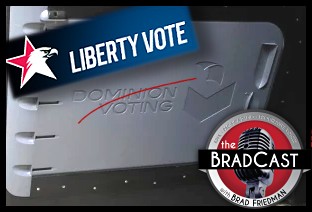 Trump-Allied GOP Partisan Buys Dominion Voting Systems: 'BradCast' 10/22/25
Trump-Allied GOP Partisan Buys Dominion Voting Systems: 'BradCast' 10/22/25 Trump, Republican Law(lessness) & (Dis)Order: 'BradCast' 10/21/25
Trump, Republican Law(lessness) & (Dis)Order: 'BradCast' 10/21/25 'Green News Report' 10/21/25
'Green News Report' 10/21/25 Celebrating 'No Kings': 'BradCast' 10/20/25
Celebrating 'No Kings': 'BradCast' 10/20/25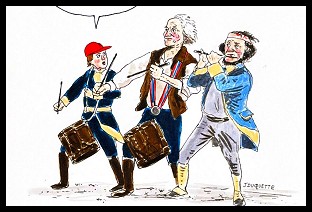 Sunday 'How It Started' Toons
Sunday 'How It Started' Toons SCOTUS Repubs Appear Ready to Gut Rest of Voting Rights Act: 'BradCast' 10/16/25
SCOTUS Repubs Appear Ready to Gut Rest of Voting Rights Act: 'BradCast' 10/16/25 'Green News Report' 10/16/25
'Green News Report' 10/16/25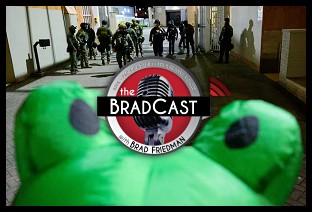 The 'Epstein Shutdown' and Other Autocratic Nightmares: 'BradCast' 10/15/25
The 'Epstein Shutdown' and Other Autocratic Nightmares: 'BradCast' 10/15/25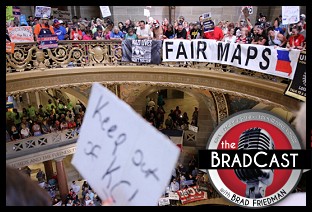 Group Vows to Block MO's GOP U.S. House Gerrymander: 'BradCast' 10/14/25
Group Vows to Block MO's GOP U.S. House Gerrymander: 'BradCast' 10/14/25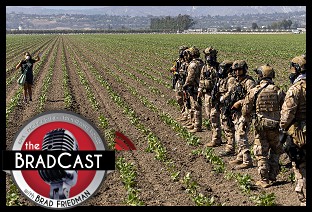 Trump Labor Dept. Warns Trump Policies Sparking Food Crisis: 'BradCast' 10/9/25
Trump Labor Dept. Warns Trump Policies Sparking Food Crisis: 'BradCast' 10/9/25 Trump's Losing Battles: 'BradCast' 10/8/25
Trump's Losing Battles: 'BradCast' 10/8/25 Trump, Roberts and His Stacked, Packed and Captured SCOTUS: 'BradCast' 10/7/25
Trump, Roberts and His Stacked, Packed and Captured SCOTUS: 'BradCast' 10/7/25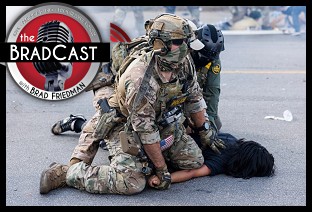 Trump Attempting His 'Invasion from Within': 'BradCast' 10/6/25
Trump Attempting His 'Invasion from Within': 'BradCast' 10/6/25 Biden Budget Expert: Mass Firings in Shutdown 'Illegal': 'BradCast' 10/2/25
Biden Budget Expert: Mass Firings in Shutdown 'Illegal': 'BradCast' 10/2/25 Why is DOJ Suing 'Blue' States for Their Voter Databases?: 'BradCast' 10/1/25
Why is DOJ Suing 'Blue' States for Their Voter Databases?: 'BradCast' 10/1/25
 VA GOP VOTER REG FRAUDSTER OFF HOOK
VA GOP VOTER REG FRAUDSTER OFF HOOK Criminal GOP Voter Registration Fraud Probe Expanding in VA
Criminal GOP Voter Registration Fraud Probe Expanding in VA DOJ PROBE SOUGHT AFTER VA ARREST
DOJ PROBE SOUGHT AFTER VA ARREST Arrest in VA: GOP Voter Reg Scandal Widens
Arrest in VA: GOP Voter Reg Scandal Widens ALL TOGETHER: ROVE, SPROUL, KOCHS, RNC
ALL TOGETHER: ROVE, SPROUL, KOCHS, RNC LATimes: RNC's 'Fired' Sproul Working for Repubs in 'as Many as 30 States'
LATimes: RNC's 'Fired' Sproul Working for Repubs in 'as Many as 30 States' 'Fired' Sproul Group 'Cloned', Still Working for Republicans in At Least 10 States
'Fired' Sproul Group 'Cloned', Still Working for Republicans in At Least 10 States FINALLY: FOX ON GOP REG FRAUD SCANDAL
FINALLY: FOX ON GOP REG FRAUD SCANDAL COLORADO FOLLOWS FLORIDA WITH GOP CRIMINAL INVESTIGATION
COLORADO FOLLOWS FLORIDA WITH GOP CRIMINAL INVESTIGATION CRIMINAL PROBE LAUNCHED INTO GOP VOTER REGISTRATION FRAUD SCANDAL IN FL
CRIMINAL PROBE LAUNCHED INTO GOP VOTER REGISTRATION FRAUD SCANDAL IN FL Brad Breaks PA Photo ID & GOP Registration Fraud Scandal News on Hartmann TV
Brad Breaks PA Photo ID & GOP Registration Fraud Scandal News on Hartmann TV  CAUGHT ON TAPE: COORDINATED NATIONWIDE GOP VOTER REG SCAM
CAUGHT ON TAPE: COORDINATED NATIONWIDE GOP VOTER REG SCAM CRIMINAL ELECTION FRAUD COMPLAINT FILED AGAINST GOP 'FRAUD' FIRM
CRIMINAL ELECTION FRAUD COMPLAINT FILED AGAINST GOP 'FRAUD' FIRM RICK SCOTT GETS ROLLED IN GOP REGISTRATION FRAUD SCANDAL
RICK SCOTT GETS ROLLED IN GOP REGISTRATION FRAUD SCANDAL VIDEO: Brad Breaks GOP Reg Fraud Scandal on Hartmann TV
VIDEO: Brad Breaks GOP Reg Fraud Scandal on Hartmann TV RNC FIRES NATIONAL VOTER REGISTRATION FIRM FOR FRAUD
RNC FIRES NATIONAL VOTER REGISTRATION FIRM FOR FRAUD EXCLUSIVE: Intvw w/ FL Official Who First Discovered GOP Reg Fraud
EXCLUSIVE: Intvw w/ FL Official Who First Discovered GOP Reg Fraud GOP REGISTRATION FRAUD FOUND IN FL
GOP REGISTRATION FRAUD FOUND IN FL

































